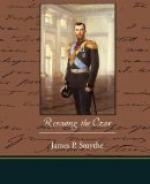It was during this period of restraint that the American, whose name we will call Fox, wrote to a friend in the United States: “You have often heard me speak of my brother who was in Turkestan when the Russian Revolution burst upon the world. He is now resting in Tasmania after going through one of the most remarkable experiences ever given to an ordinary tea merchant intrusted with some secrets of the greatest land monopoly in the world. You may call it a fairy tale; and if you did not know me as a business man of ordinary sense, I should hesitate to intimate that Nicholas R—— and all the family are quite well, I thank you, not a million miles distant from my brother.”
Fox had learned from his experience at Geneva that governments are sometimes cajoled by diplomatic pressure to do undreamed-of things. The dispatch of an expeditionary force to Siberia by the United States without a declaration of war against the Revolutionists struck him as an instance of this kind, and he knew his correspondent to be sufficiently versed in the underground politics of Europe to look for a connection between some member of that expedition and the subject mentioned in the two foregoing letters. This connection was innocently revealed by a newspaper report from a Western city concerning a wounded soldier who had recently returned to an American Army hospital. The particular name being given, it was easy enough for Fox’s correspondent to meet the soldier on some errand of mercy and to obtain the revelations that are hereinafter made.
The soldier was a young commissioned officer who was having an artificial jaw supplied to replace the one shot off in a Bolshevik encounter. He had greatly recovered when the call was made and an opening naturally presented for the soldier to recount the part he played in the adventure of his country in the Revolutionary drama of that hour.
“I’m as certain as I’m living,” the wounded soldier said, “that a Bolshevik is as ‘nutty’ as a rabbit. The fellow I had by the neck before my lights went out was putting up a holler, in German, and claiming to be a personal friend of some personal friend of the missing Czar. Before he finally passed in his chips he gave me a bundle of paper diaries he had stolen down in China, and he asked me to return them to their rightful owner so that he might die without a sin upon his conscience. Honestly, that chap was dead in earnest in this matter of his conscience. I took the stuff, of course; but I never thought about them until the other day. Since then they seem to haunt me. I wonder if you’d mind looking them over if the nurse’d get them out?”
“With pleasure,” was the reply.
The nurse brought in an old leather bag, from which the Captain extracted two begrimed and blood-smeared rolls written in a very small but strong and vigorous hand.
While looking over the documents in a casual way a loose leaf fell to the floor. Upon picking it up, there was found to be written on one side in bold underscored letters:




